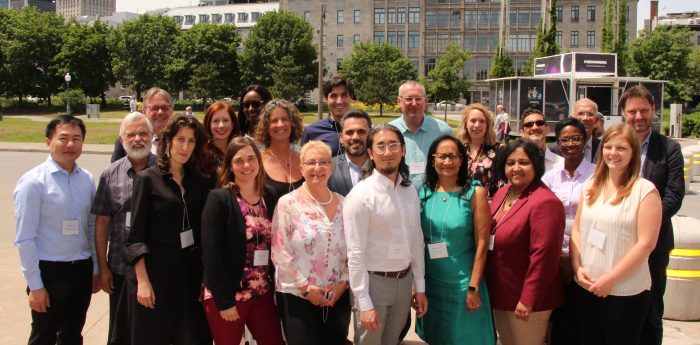Source: School of Physical and Occupational Therapy
On June 24 and 25 experts from around the world gathered in Montreal to discuss the pressing challenge of policy coherence for tobacco, alcohol and food governance. Supported by funding from the Social Sciences and Humanities Research Council (Canada), McGill Global Health Programs and the United Nations Development Programme, the two-day meeting brought together 23 policy leaders and scholars from five continents to share theoretical, empirical and experiential insights into the drivers of policy (in)coherence to control the three major product-related risk factors for non-communicable disease (NCD): alcohol, unhealthy food and tobacco.
The meeting was organized with the recognition that there is a critical need to bridge the work being conducted to control alcohol, tobacco and unhealthy foods – work that often occurs in silos – in order to inform scholarship and policy action on policy coherence. The two-fold aim of the meeting was to share insights and experiences on policy coherence in order to generate an actionable research agenda across the three commodities, and to establish a network of researchers, policy makers and advocates to advance policy in this domain. Ultimately, participants sought to answer the question of how can we foster policy coherence towards the goal of effective governance across unhealthy commodities?
Meeting participants discussed the definition and multiple facets of policy incoherence in relation to NCD prevention. In particular, they focused on the governance of commodities associated with NCD risk (alcohol, food and tobacco) across government sectors, including the role of key economic sectors such as trade, finance, agriculture and industry. It was clear from presentations that incoherence currently exists across countries and commodities, leading to inefficiencies in governance as well as economic externalities and other costs. One focus of the meeting was on the need for tool development to support practice and advocacy – moving beyond implementation of specific ‘best practice’ policies recommended, for example, by the World Health Organization, to consider context-specific inconsistencies between the priorities and activities of different policy sectors. Another key focus area was the opportunity to frame issues more effectively, to generate policy change. Participants also identified opportunities for the development of new methods to study policy change and (in)coherence, and the benefits of documenting experiences of ‘success’ in policy coherence globally to support future action.
The meeting demonstrated high levels of consensus regarding the significance of promoting policy coherence in advancing both global health and the agenda; this consensus extended across policy areas, sectors, regions and disciplines. Equally, however, the event highlighted the need for significant research, methodological development and policy work if such potential is to be realized. There is a clear need for an inclusive network that can bring together interested academics, advocates and policy makers to serve as a hub capable of advancing such work across policy issues and to co-ordinate initiatives across regions. In building upon the papers contributed by participants, it will be important moving forward to more effectively document the hidden policy costs and damaging impacts of existing incoherence, and to learn from both policy initiatives that have sought to promote coherence and innovative policy forums that have promoted integration across issue areas. In working towards a goal of creating tools and resources capable of assisting countries and health agencies in maximizing scope for coherent approaches to NCD governance, existing analytical frameworks need to be revised to address distinctive challenges associated with unhealthy commodities. The participants were united in their enthusiasm for advancing these linked research and policy agendas.
Have something to add to this conversation? Please contact Raphael.Lencucha PhD.
Watch video to learn more about Raphael Lencucha PhD, here:
Meeting participants (pictured) included:
- Jeff Collin (University of Edinburgh)
- Raphael Lencucha (McGill)
- Anne-Marie Thow (University of Sydney)
- Doug Webb (United Nations Development Programme)
- Paula Johns (ACT, Brazil)
- Maristela Monteiro (Pan-American Health Organization)
- Ronald Labonte (University of Ottawa)
- Mulenga Mukanu (University of Zambia)
- Jeffrey Drope (American Cancer Society)
- Shoba John (University of Edinburgh)
- Trevor Hassell (Healthy Caribbean Coalition)
- Si Thu Win Tin (Pacific Community)
- Rodrigo Santos Feijo (Framework Convention Secretariat)
- Renuka Jayatissa (Ministry of Health, Sri Lanka)
- Chantal Blouin (INSPQ, Quebec),
- Megan Arthur (University of Edinburgh)
- Adriana Appau (McGill)
- Luciana Castronuovo (FIC, Argentina)
- Hasan Hutchison (Health Canada)
- Natacha Lecours (International Development Research Centre)
- Zee Leung (International Development Research Centre)
- Ashley Schram (Australian National University)
- Laurette Dube (McGill)
July 12, 2019

